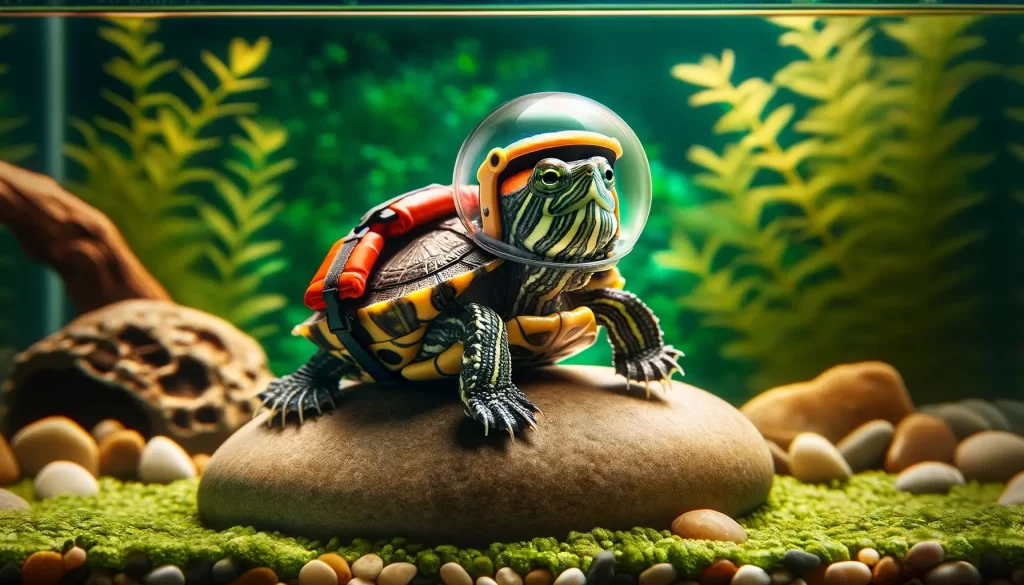
So, you’re considering getting a pet turtle, but you’re not quite sure if it’s a safe choice?
Well, you’ve come to the right place! In this article, we’ll explore the world of pet turtles and answer the burning question, “Are pet turtles safe?”
Whether you’re worried about potential health risks, the safety of your children, or the environmental impact, we’ll cover it all.
By the end, you’ll have a clearer understanding of the safety aspects associated with owning a pet turtle. Stick around, and let’s navigate through the shell of this intriguing topic together!
Health Risks Associated with Pet Turtles
Transmission of Salmonella
One of the main health risks associated with pet turtles is the transmission of Salmonella. Turtles, especially small ones, can carry this bacteria in their feces, and it can easily contaminate their shells and the surrounding environment. If proper hygiene practices are not followed, such as washing hands thoroughly after handling a turtle or cleaning its habitat, there is a risk of contracting a Salmonella infection. Particularly vulnerable to this are young children, older adults, and individuals with compromised immune systems.
Allergies to Turtle Proteins
While not as common as Salmonella transmission, some individuals may develop allergies to proteins found in turtle urine, saliva, or dander. These allergies can lead to symptoms like skin rashes, itching, nasal congestion, and even respiratory problems in severe cases. It is important to be aware of this potential risk, especially if you or someone in your household already has a history of allergies.
Injury from Handling
Another risk associated with owning pet turtles is the potential for injury from handling. Turtles have sharp claws and strong jaws, which they may use to defend themselves if they feel threatened or scared. It is crucial to handle turtles gently and avoid putting your fingers near their mouths to prevent bites or scratches. Additionally, if a turtle falls from a height or is mishandled, it can sustain injuries such as shell fractures, which can be both painful and potentially life-threatening.
Risk of Respiratory Infections
Pet turtles are also susceptible to respiratory infections, especially if they are kept in improper conditions. Factors such as low humidity levels, inadequate ventilation, and exposure to cold drafts can weaken a turtle’s immune system and make them more prone to respiratory illnesses. Symptoms of respiratory infections in turtles include wheezing, difficulty breathing, nasal discharge, and lethargy. Prompt veterinary attention is essential if you notice these signs in your pet.
Best Practices for Caring for Pet Turtles
Proper Hygiene and Handwashing
To minimize the risk of contracting Salmonella or other potential infections from your pet turtle, it is crucial to practice proper hygiene. Always wash your hands thoroughly with soap and water after handling the turtle, cleaning its habitat, or coming into contact with any of its belongings. Use sanitizing solutions specifically designed to eliminate bacteria on surfaces, especially when cleaning the enclosure or objects that may have come into contact with turtle feces.
Creating a Suitable Habitat
Providing a suitable habitat for your pet turtle is essential for its well-being. The enclosure should be large enough to allow the turtle to move freely and engage in natural behaviors. It should also include areas for basking, swimming, and hiding. Research the specific requirements of your turtle species to determine the appropriate temperature, lighting, and humidity levels for their enclosure. Regularly clean the habitat and replace the water to maintain a clean and healthy environment.
Providing Quality Nutrition
A balanced diet is crucial for the health of your pet turtle. Different species have varying dietary requirements, so it is important to research and understand the specific nutritional needs of your turtle. In general, turtles require a combination of commercial turtle pellets, fresh vegetables, and occasional protein in the form of insects or cooked lean meats. Avoid offering foods that are high in fat, salt, or artificial additives, as these can lead to health problems such as obesity or organ dysfunction.
Regular Veterinary Check-ups
Just like any other pet, turtles benefit from regular veterinary check-ups. A reptile-experienced veterinarian can assess the overall health of your turtle, provide necessary vaccinations, and detect any potential health issues early on. Regular examinations can also help in identifying and preventing common turtle ailments such as respiratory infections, shell abnormalities, or parasites. By maintaining a good relationship with a qualified veterinarian, you can ensure the optimal health and well-being of your pet turtle.
Safety Measures for Interacting with Pet Turtles
Supervising Children and Pets
When it comes to interacting with pet turtles, supervision is crucial, especially when children or other pets are involved. Young children may not understand how to handle turtles gently, which can result in injury to both the child and the turtle. Similarly, other household pets, such as dogs or cats, may view turtles as prey or become aggressive towards them. Always closely monitor interactions between turtles, children, and other animals to avoid accidents or harm to any party involved.
Avoiding Rough Handling
Turtles have delicate bodies, and rough handling can cause serious harm. Avoid squeezing or pressing on the turtle’s shell, as this can lead to fractures or internal injuries. Instead, hold the turtle gently and support its body and limbs to prevent unnecessary strain or harm. Educate yourself and others in your household about the proper way to handle a turtle to ensure the safety and well-being of the pet.
Minimizing Exposure to Feces
Turtle feces can harbor bacteria and parasites, presenting a potential health risk. Minimizing exposure to feces is important for both the turtle and the owner’s well-being. Regularly clean the turtle’s habitat, promptly removing any soiled substrate or feces. Wash your hands thoroughly after cleaning the enclosure or handling any soiled objects. By implementing these measures, you can reduce the likelihood of coming into contact with harmful pathogens.
Preventing Escapes
Turtles are curious creatures and may try to escape their enclosures if given the opportunity. Escaping can put a turtle at risk of injury or death, especially if they are unable to find suitable food or shelter in their new environment. To prevent escapes, ensure that the enclosure is securely closed and that there are no gaps or holes through which the turtle can squeeze. Regularly inspect the enclosure for any potential escape routes and make necessary repairs or adjustments.
Choosing a Suitable Turtle Species
Researching Species Requirements
Before acquiring a pet turtle, it is essential to research and understand the specific requirements of different turtle species. Each species has unique needs in terms of habitat, temperature, diet, and overall care. Some turtles may require more space or specific environmental conditions that may be challenging to provide. By thoroughly researching and considering these requirements, you can choose a turtle species that aligns with your capabilities and the resources you can offer.
Considering Size and Lifespan
It is crucial to consider the potential size and lifespan of the turtle species you are interested in. Some species can grow quite large, and their enclosures need to accommodate their eventual adult size. Additionally, turtles are known for their longevity, with some species living for several decades. Before deciding on a specific turtle species, make sure you are prepared for the long-term commitment and can provide for their needs throughout their lifespan.
Availability of Veterinary Care
It is important to consider the availability of veterinary care for the turtle species you are interested in. While turtles can make wonderful pets, not all veterinarians have the necessary expertise and experience in treating reptiles. Before bringing a turtle home, research and identify reptile-savvy veterinarians in your area. Regular veterinary check-ups and access to specialized care can significantly contribute to the overall health and well-being of your pet turtle.
Potential Risks of Turtle Habitats
Hazardous Enclosures and Equipment
Turtle habitats that are not carefully designed and maintained can pose various risks to the health and safety of the turtles. Sharp edges or protrusions within the enclosure can cause injuries, especially if the turtle collides with them during swimming or exploring. It is essential to always inspect the enclosure for any potential hazards and make the necessary modifications to ensure the turtle’s safety. Additionally, ensure that any equipment used, such as heating elements or lighting fixtures, are properly installed and secured to prevent accidents.
Contaminated Water Sources
Water quality is crucial for the health of aquatic turtles. Contaminated water sources can lead to various health issues, including skin infections, shell problems, or respiratory illnesses. To maintain a clean and safe water environment, regularly monitor and adjust the water temperature, pH levels, and filtration system. Use dechlorinated and properly treated water, and consider using a water conditioner to remove any harmful chemicals or toxins.
Toxic Substrates and Decorations
Certain substrates or decorations used in turtle habitats may be toxic if ingested or cause injuries if the turtle comes into contact with them. Avoid using materials like gravel, which can be accidentally consumed and lead to intestinal blockages. Instead, opt for substrates specifically designed for turtles, such as coconut coir or aquatic sand. When choosing decorations, ensure they are non-toxic and do not have small parts that the turtle could swallow. Regularly inspect the habitat for any damaged or deteriorating items that might pose a risk.
The Legal and Ethical Aspects of Owning Pet Turtles
Researching Local Laws and Regulations
Before deciding to own a pet turtle, it is important to research and understand the local laws and regulations regarding turtle ownership. Some jurisdictions have restrictions on certain turtle species, particularly those that are considered invasive or protected. Familiarize yourself with any permits or licenses required to legally keep a turtle as a pet. By complying with the applicable laws, you can ensure that you are acting responsibly and ethically in your turtle ownership.
Avoiding Exotic or Protected Species
When considering a pet turtle, it is essential to avoid acquiring exotic or protected species. Many exotic turtles are illegally captured or traded, contributing to the decline of wild populations and the spread of diseases. Additionally, protected turtle species are often at risk due to habitat loss or other human activities. Opt for turtles that have been bred in captivity and are not threatened or endangered. By making responsible choices, you can help conserve wild turtle populations and avoid supporting illegal or unethical practices.
Considering Conservation and Ethical Concerns
Turtle ownership should be approached with consideration for conservation and ethical concerns. The demand for pet turtles can contribute to unsustainable capture and trade practices. Additionally, releasing pet turtles into the wild is highly discouraged, as they can negatively impact local ecosystems and compete with native species for resources. If you can no longer care for your pet turtle, seek out responsible and reputable organizations or individuals who can provide proper care or find suitable homes for them.
Benefits and Rewards of Owning Pet Turtles
Educational Opportunities
Owning a pet turtle can provide numerous educational opportunities, especially for children. Turtles offer a chance to learn about biology, ecology, and the natural world. By observing their behavior and studying their anatomy, individuals can gain a deeper understanding of reptiles and their role in our ecosystem. Additionally, caring for a turtle can teach children responsibility, empathy, and patience.
Therapeutic Effects
Interacting with animals, including pet turtles, has been shown to have therapeutic effects. Watching turtles swim peacefully or spending time handling and caring for them can promote relaxation and reduce stress. The calming nature of observing turtles in their habitats can provide a soothing and meditative experience, improving mental well-being and overall quality of life.
Companionship and Emotional Support
Turtles may not be as interactive or affectionate as some other pets, but they can still provide companionship and emotional support. Observing a turtle’s activities and behaviors can be satisfying and can help alleviate feelings of loneliness. Having a pet turtle can also foster a sense of responsibility and purpose, as they rely on their owners for their well-being.
Common Misconceptions about Pet Turtles
Longevity and Commitment
One common misconception about pet turtles is that they have short lifespans and require minimal commitment. In reality, many turtle species can live for several decades, with some even surpassing 50 years. Turtles are long-term commitments, and potential owners need to be prepared for the responsibility of caring for them throughout their entire lives.
Maintenance Requirements
Another misconception is that pet turtles are low-maintenance pets. While they may not require daily walks or constant attention like dogs, turtles still have specific care needs that must be met. This includes providing appropriate habitat conditions, regular cleaning, and ensuring a balanced diet. Regular maintenance tasks like water changes and habitat cleaning are necessary to keep the turtle and its environment healthy.
Aquarium Size and Water Quality
Many people underestimate the size of the aquarium needed to house a pet turtle and the importance of maintaining good water quality. Turtles grow larger than most people anticipate and require ample swimming space. Additionally, maintaining optimal water quality is crucial for the well-being of the turtle. Regular testing and monitoring of water parameters, as well as proper filtration and cleaning, are necessary to ensure a healthy aquatic environment.
Ensuring the Well-being of Pet Turtles
Providing Adequate Space and Enrichment
To ensure the well-being of pet turtles, it is essential to provide them with adequate space and enrichment. Turtles thrive when they have enough room to swim, bask, and explore. The enclosure should be spacious enough to accommodate their adult size and offer various hiding spots and objects to interact with. Enrichment activities like providing toys, changing the habitat layout, or offering different types of food can also contribute to the mental stimulation and overall happiness of the pet.
Monitoring Health and Behavior
Regularly monitoring the health and behavior of your pet turtle is crucial for early detection of any potential issues. Keep an eye out for changes in appetite, behavior, or physical appearance. Unusual lethargy, loss of appetite, abnormal breathing sounds, or shell abnormalities should prompt a visit to a reptile veterinarian. By closely monitoring your pet turtle, you can address any potential health concerns promptly and ensure they receive appropriate care.
Seeking Professional Advice
When it comes to the well-being of your pet turtle, it is essential to seek professional advice from qualified reptile veterinarians or experienced reptile enthusiasts. These individuals can provide guidance on proper care, diagnose and treat health issues, and help create suitable habitats for your pet. Building a network of knowledgeable experts can be invaluable in ensuring the optimal health and happiness of your pet turtle.
Final Thoughts
Owning a pet turtle can be a rewarding experience, but it also comes with responsibilities.
Understanding the potential health risks and best practices for care is crucial to ensure the well-being of both the turtle and its owner.
By following proper hygiene measures, creating a suitable habitat, and providing quality nutrition, owners can mitigate health risks and promote a healthy and fulfilling life for their pet turtles.
Additionally, being aware of the legal and ethical aspects of turtle ownership and debunking common misconceptions can help individuals make informed decisions about acquiring a pet turtle.
With the right knowledge and commitment, owning a pet turtle can offer educational opportunities, therapeutic effects, and companionship for many years to come.



